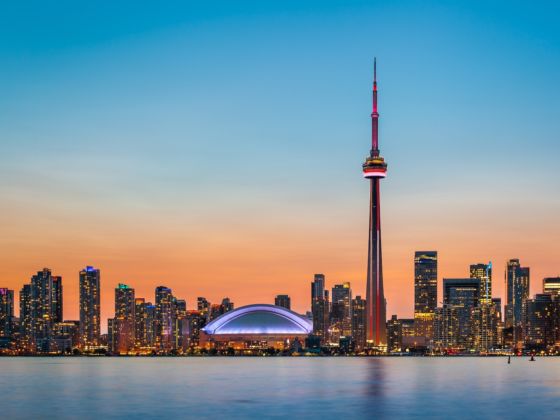

The “6ix” or “Turonno” is a city that thrives to make everyone feel at home. The multiculturalism of Ontario’s capital means that any person, visiting or local, whatever their interest or taste, can find their community within the city. Toronto has many ethnic neighborhoods, from Chinatown to Little Portugal, loads of art galleries and museums, intercity parks, street festivals, wild nightlife, and cozy patios. There are even islands out on Lake Ontario, easily accessible by ferry, that make room for those who like to enjoy the outdoors in their birthday suit. This guide will help you find out where you can have the best fun during your time in the 6ix.
Compared to many other Canadian cities, Toronto has a mild winter, but that does not mean it’s anywhere near warm: according to The Weather Network, the temperature during winter averages around 26 degrees Fahrenheit. The worst weather months are January and February, when extreme weather like hail, slush, snowstorms, and ice storms can strike at any time. That said, don’t be afraid to visit during the winter months — there are many indoor activities to keep visitors out of the cold. Like anywhere where the sunny season is short, the city comes alive with incredible energy in the summer. Torontonians take full advantage of the clement weather, and this is obvious in the busy patios and street festivals that pop up from late May to late September. The absolute best weather will be from late June to early September. Temperatures during these months average around 68 degrees Fahrenheit, and humidity will vary.
Like the rest of Canada, Toronto uses the Canadian dollar (CAD). The conversion is $1.36 per 1 USD. Recent banknotes that feel like they are made of plastic are used for denominations of 5, 10, 20, 50 and 100. Canadians have specific terms for the $1 and $2 coins: “loonie” (because of the loon featured on the reverse) and “toonie” (because it’s fun and because it’s two dollars), respectively. When making purchases in Canada you will notice a sales tax which is added to the price of the item at the counter. Tipping is expected when receiving services in restaurants, hotels, cabs and at the hairdressers. A tip in the range of 15 to 20 percent is considered normal and should be calculated based on the pre-tax amount.
Although Canada’s official languages are English and French, in Toronto you will mostly hear English spoken, except for public announcements which are made in both French and English. Beyond these official languages, Statistics Canada reports that Toronto is Canada’s most linguistically diverse city. On top of English, you will likely hear Torontonians conversing in Cantonese, Hindi, Italian, Spanish, Tamil, Mandarin, Portuguese, Farsi, Russian, and more.
Public transportation in Toronto is solid, so leave your car in the garage. The UP Express train connects users from Pearson International Airport to Union Station in the downtown core in 25 minutes. Visitors to Toronto rely mostly on the Toronto Transit Commission (TTC) which connects riders quickly to all of Toronto’s downtown neighborhoods. The TTC provides fast and reliable subway, streetcar, and bus service within the otherwise very congested city. Day, weekday, and weekly passes are available, and be sure to download a TTC app to your phone for schedules and trip planning. Although not all thoroughfares have bike lanes, it is possible to get anywhere in the city by bicycle in the warmer months. Tourists have the option of renting bicycles through Bike Share Toronto. Stations are located all over the city and you can use your credit card to rent bicycles from these stations for unlimited 30-minute trips. Because stations are all over, bicycles can be left at a different station upon arrival at a destination. While cycling in Toronto can be a fun and fast way to get around, be aware of cars, pedestrians, and street traffic in general. If you have a helmet, wear it. Taxis, Ubers, and Lyfts are readily available in Toronto. Uber and Lyft will typically be cheaper than cabs, but if you prefer going the old-fashioned way, cabs are reliable, safe, and easy to notice and flag.
Toronto is generally very safe but keep an eye out for pickpockets. Be a little more cautious around the intersections of Jarvis street and Carlton streets, as well as Dundas Street and Parliament Street. The Jane-Finch neighborhood, in the northwest suburbs of the city, is one to avoid.
Recreational cannabis was legalized in Ontario in October 2018. That said, the only legal way to purchase marijuana is from the Ontario Cannabis Store — the dispensaries sprinkled across the city are technically not allowed. Some things to keep in mind if you intend to use cannabis while visiting Toronto:
Toronto's sports bar scene is second to none.
Want to walk to World Cup games and crash somewhere cool after? Start here.
Unwind after the match in style.
If you're smart, you'll snag tickets to a Maple Leafs game while you're there, too.